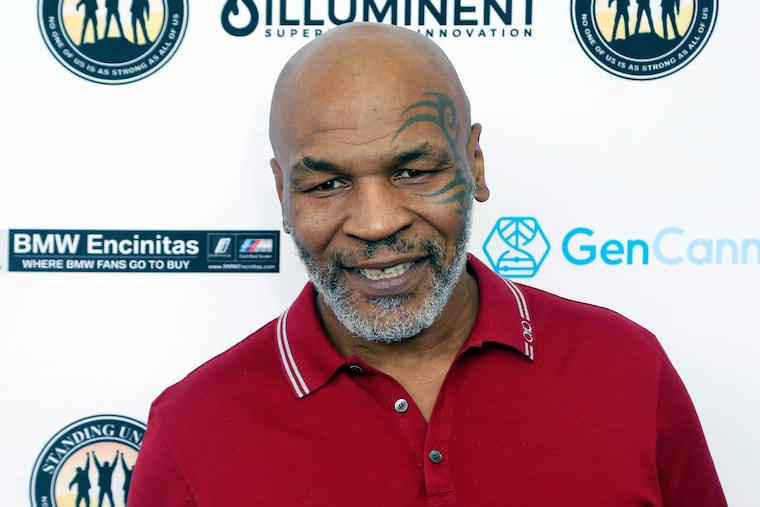Mike Tyson is right: Hulu’s exploitation of his story is more Hollywood racism | Solomon Jones
The entertainment industry loves to steal Black stories without giving due respect.

The tale of Mike Tyson’s life is riveting.
Abandoned by his father at age 2, Tyson and his two siblings were raised by a single mother who moved the family to a crime-ridden Brooklyn neighborhood called Brownsville. After suffering relentless bullying, Tyson learned to fight, joined a gang, and was arrested repeatedly before he was sent to the Tryon School For Boys. There he met counselor Bob Stewart, a former amateur boxer who tutored Tyson before introducing him to legendary trainer Cus D’Amato. It was D’Amato who took custody of Tyson when he was released from Tryon at 14. A trainer and father figure to the promising young boxer, D’Amato told Tyson he could become heavyweight champion of the world. By the age of 20, Tyson did just that.
» READ MORE: Lee Daniels talks about ‘U.S. vs. Billie Holiday’ and the Black women of Philly who inspire all his work
If you stopped right there, Tyson’s story is the kind of rags-to-riches tale that inspires and entertains. However, Mike Tyson is more complicated than that, and the complications are what make the story his own. Hulu, a livestreaming service looking to create standout content in a crowded field where Netflix is still king, is gambling that Tyson’s story will pay dividends as they launch a new drama series based on his life. It’s called Iron Mike, and the eight-episode biopic does not involve Tyson at all. He won’t be consulted, he won’t appear onscreen, and perhaps most importantly, he won’t be paid.
Tyson has called the series “tone-deaf cultural misappropriation” and another example of Hollywood’s racism.
I think Tyson is right. One need look no further than the Golden Globes, an awards show that is run by the Hollywood Foreign Press Association, which has no Black members and has not had a Black member in the past 20 years. Being recognized at the award show, which aired this week, is one of the key markers of critical success in Hollywood. But Hollywood is a white place run by white people — a place where Black lives are seldom portrayed as being equal to white lives. That point wasn’t lost on Tyson, and he said as much in an Instagram post when the series was announced.
“These actions taken by Hulu are just the tip of the iceberg,” Tyson wrote. “We shouldn’t be surprised by these abhorrent actions as they represent the systemic racism that has plagued Hollywood for its entire existence. These corporate giants hide behind ploys and praise themselves for offering tone-deaf attempts at diversity and inclusion like Hulu’s ‘Black Stories’ playlist that recommend stories about Black culture to viewers on the app. Yet behind closed doors they steal stories from the Black community.”
Again, Tyson is right. Hollywood has long been a place where Black people are exploited, underpaid, and misrepresented in stories that perpetuate racism and white supremacy. Black actors like Lincoln Perry played literal caricatures like Stepin Fetchit, while white stars in blackface breathed life into racist stereotypes. And when Black actors were finally recognized for excellence, their Oscar wins were tied to Black servanthood. Hattie McDaniel became the first African American actor to win an Academy Award for her portrayal of a maid, for example.
In short, Hollywood has perpetuated and magnified American racism. Along the way, it has made money on the backs of Black people wherever possible. The exploitation of Mike Tyson is not the exception. It is the rule.
» READ MORE: From ‘Soul’ to ‘Lovers Rock’ to ‘Ma Rainey’s Black Bottom,’ celebrating the new Black music movies
That’s what James Elam, a former entertainment attorney who now serves as president and CEO of Elamental, told me when I asked him about the Tyson story, which is being produced by the same mostly white production team that produced the biopic I, Tonya. They interviewed Tonya Harding extensively for that production, a courtesy they apparently did not extend to Tyson.
“That’s almost all the movies,” Elam said of the white team producing Iron Mike. “That’s normal, not the exception.”
For Tyson, who was accused by his former wife Robin Givens of domestic abuse in 1988, his life after losing the heavyweight championship was chaotic. In 1992, he was convicted of raping a beauty pageant contestant and served three years in prison. While he came out and remade his life — he has been married to his third wife, Kiki Spencer, since 2009 — there is a dangerous, bad boy element to his story that’s hard to miss. Elam said Hollywood has always cashed in on that when it comes to Black men.
“There’s money in selling stories about [so-called] ‘evil Black men,’” Elam said.
There’s also money in redemption. Let’s hope that some of the money for Tyson’s story eventually makes its way to the man who lived through the chaos and made it to the other side.